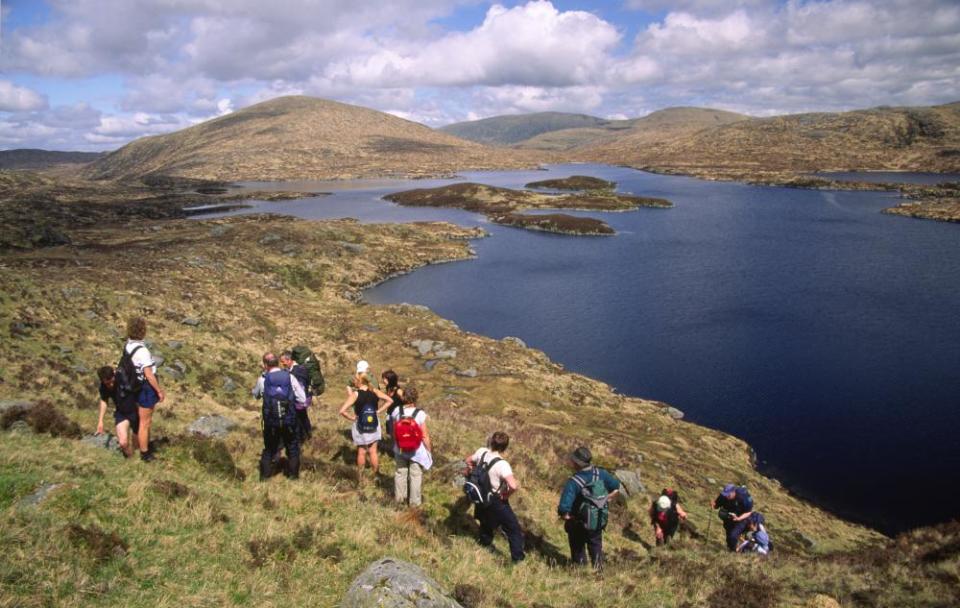Is that a unicorn? No, it’s a teenager taking a hike in the great outdoors…

If you are aged 18 to 26 and looking around on Facebook for something to spice up your social life and boost your sense of wellbeing at the same time – even during lockdown – the last place you would expect to end up is the Ramblers.
Yet those silver-haired, sensibly clothed people you see trundling along with their walking poles on the British footpath network have their eye on you.
The Ramblers is targeting people young enough to be their grandchildren, and the early results of a pilot scheme in Scotland are hugely encouraging.
“You were more likely to see a unicorn cycling to the moon than an 18-year-old on one of those walks, when I first started,” said Sam Knight, the Ramblers’ head of young walkers projects in Scotland.
That was only two years ago. You would not often see the Ramblers on social media either, but they used Facebook to advertise to youngsters, and their Instagram account has doubled its following in a year, to 16,000.
“Engaging the 18-26 demographic for the Ramblers is completely new, but there is an appetite for it – it’s just getting the word out there and getting people to take that first step,” said Knight.
Emma Gillanders, 24, said her decision to enrol via Facebook was “one of the best things I’ve ever done in my life”.
Knight, 35, runs the project, called the Out There Award, and is amazed by the feedback from “young people who had a negative brand image of the Ramblers or no awareness whatsoever”.
Research carried out three years ago showed the need to set up a way for young people to get walking and create a network.
Two in five young people said their mental health would suffer if they could not get out into open spaces – a number that is sure to have risen during lockdown. Further research by YouGov showed that younger people value green spaces more than older Britons.
Scotland is one of the most open and popular walking destinations in the world, but the walkers are older and richer than the Out There target group. The main barriers to young people getting out on Scotland’s footpaths and munros – the 282 mountains of 3,000ft or more – are lack of knowledge, not having anyone to go with, and the cost.
Because students have their own networks, the Out There project focuses on those who left school and found themselves out of the organised groups that helped them to mix and stay active, especially young women.
The Scottish government put in funding, with the proviso that half of those taking part should be female, and there was a top-up from the People’s Postcode Lottery. Now the Ramblers in England and Wales are believed to be watching the project with an eye to rolling it out south of the Scottish border.
The first intake in 2019, when Knight started, was 79% female, and more than a third from ethnic minorities.
Lockdown has put a huge hole in plans. Award weekends were cancelled throughout 2020, and an Out There event planned for next Saturday in Inverness has been put back to May.
The courses are free, as is a year’s membership of Ramblers and access to young walking groups across Scotland.
“The social networks are massive at the moment,” said Knight. “It’s not ‘here’s some skills, now bugger off’, it’s, ‘here’s some skills and here’s a pathway.’
Related: Can I love the great outdoors – or is that just 'white people stuff'?
“There’s genuine follow-on, and you can go on as many walks as you like with the young walking groups [walkers in their 20s and 30s].”
The key learning points are where to go, in towns and cities as well as “out there” in the remote countryside, and also what gear you are likely to need, what food and drink to take, how to read a map and how to plan a walk.
After a day of skills learning, there is a group walking challenge, organised collectively by young people who had never met before.
The social benefits of walking were raised in a recent issue of Walk, the Ramblers’ magazine, by the comedian and travel writer Dom Joly.
He said walking “is a little like dating. Walking gives you that commonality where you discover things together. If you had told my 20-year-old self this, I would have been howling with laughter.
Walk this way – case study
Emma Gillanders was not into walking as a teenager, but now she knows what she missed and is very pleased she decided to sign up for the Out There Award.
Gillanders, 24, works part-time selling phones and lives in Falkirk with her 22-year-old partner, Andrew Packham, a student at Edinburgh University.
They don’t drive and or have a lot of money. “The biggest thing for me was that it was free – it would put a lot of young people off if you had to pay for it,” Gillanders says.
“Getting to meet like-minded people was big for me. So was picking up on skills like what kit you need, and map reading.”
Packham says: “Car-sharing [with other walkers] means we get to places public transport won’t go. Meeting others and sharing experiences helped to keep me motivated to get out more, which has resulted in some really memorable days.”
Gillanders, who walks 10-12 miles in a Young Walkers group but feels “I could go on for longer”, has “done a massive job” to persuade friends and relatives to join Out There.“They might have been sceptical before, but when I tell them about it they’re not.”

 Yahoo Finance
Yahoo Finance 